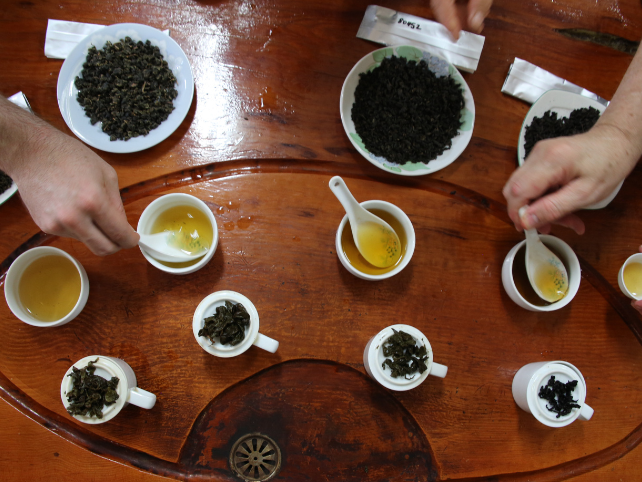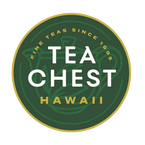
Tea Buying Guide: Tips to Finding the Right Tea
Tea makes a great gift
As the holidays approach, we begin to think about gifts for friends and family. Consider giving tea. Tea makes a perfect gift because it is a thoughtful and delicious present that can be enjoyed by everyone. Whether the recipient is a tea enthusiast or a curious beginner, there are endless varieties to fit anyone’s tastes and preferences. Additionally, tea has numerous health benefits, making it a gift that shows you care about someone’s well-being. Furthermore, tea can be a great way to introduce someone to new cultures and traditions, as many countries have unique tea customs. Overall, giving the gift of tea is a thoughtful gesture that can be appreciated by anyone.
With so many different types and flavors available, it can be overwhelming to know where to begin. Fear not, with some knowledge from our in-house experts, you can find the perfect tea to suit both of your tastes or those of a friend. Whether you're looking for a relaxing ritual or a healthful beverage, there's tea for everyone and every mood. In this article, we will guide you through the process of finding the perfect tea for you and your friends to enjoy.
Buying fine teas
Motivating factors for buying finer teas include seeking better taste, looking for authentic culinary and cultural experiences, and giving unique gifts not sold in the grocery store.
Here are a few things to consider when buying loose tea. First, consider the type of tea you want, such as green, black, or herbal especially if your gift is for someone sensitive to caffeine.
Look for larger-sized leaves that are whole and unbroken, with uniform color and texture. Speckling in tea is caused by two things, leaf tips or stems. White tips are a sign that the tea was hand-picked while the leaves were still young and tender and usually indicate higher quality. Stems can degrade the taste and usually are a sign of lower quality.
| Leaf Grade | Description |
| OP | Orange Pekoe - whole leaves without tips |
| FOP | Flowery Orange Pekoe - whole leaves with some tips |
| TFOP | Tippy Flowery Orange Pekoe - whole leaves with more tips |
| BOP | Broken Orange Pekoe - less than whole leaves |
| BP | Broken Pekoe |
| F | Fanning - larger tea bag cut |
| D | Dust - "floor sweepings" |
The origin of the tea also is an indicator of taste and how the tea has been grown and processed. Tea is a part of a region’s cuisine and the style that the tea is made will usually match the foods of the area in which it was grown. For example, foods in Asian countries like Japan, Taiwan, and China are seasoned with ingredients like soy sauce and mirin. These foods are lighter animal fats and proteins so the teas from these countries tend to be light on the palate with greener notes from grassy to herbaceous. Foods are also served raw like pickled vegetables and sashimi so the teas tend to be astringent to cleanse the palate. Cuisines in Europe and America incorporate ingredients like butter and wine in their sauces. They contain more animal protein. Because of their colonial past, teas grown in Southeast Asia like India and Sri Lanka were developed to match the cuisines of Europe so they tend to be earthy, and rustic with heavier bodies.
Finally, consider additional ingredients or flavors, such as fruits or spices, that are often added to tea. Accounting for these factors will ensure that you're getting a high-quality product that will provide a delicious and enjoyable experience.
Tea varieties and personalities
White tea - Delicacy
White tea is a unique delicacy in the tea world because less than 1% of all teas produced qualify as white tea. If you are in the mood for an exotic, yet gentle experience, white tea is a perfect fit. It is delicate, earthy, and naturally sweet which can bring a sense of mindfulness, purity, and elegance. Just like appreciating the finer things in life, white tea allows you to savor the subtleties and enjoy every moment.
White tea is the least processed tea with the highest antioxidants. There should be lots of white down on the tea leaves which indicate it's been picked at the right time and handled properly. White down first appears on the leaf buds when they are young and are lost as the leaf matures. White tea is made with these very young tea buds which have more white hair down on them. The white down falls off the leaves as the tea gets older. The best-selling white tea is Silver Needles. Look for plump, unopened leaf buds with lots of white down on them. The whiter the color, the higher the grade and price. Darker grades usually taste smokier than top grades.
Green tea - Serenity
Green tea, with its light vegetal and floral flavors, is perfect for those seeking mindfulness, balance, and serenity. Green tea offers simplicity and tranquility to escape from the hustle and bustle of daily life. Known for its abundant antioxidants and wholesome properties, green tea offers benefits that align with well-being.
When it comes to selecting a good green tea, there are a few key qualities to look for. First, the leaves should be a distinct green indicating that they are fresh and have been minimally processed. Additionally, the leaves should be whole and unbroken, as this helps to preserve their flavor and aroma. By keeping these qualities in mind, you can ensure that you're selecting a high-quality green tea that will offer an enjoyable experience.
Finally, pay attention to the origin of the tea and look for varieties that have been grown in high-altitude regions as these tend to produce the best quality leaves. There are two distinct camps for green tea when it comes to taste. Chinese green teas are more floral with a slight smokiness. Japanese green teas like Sencha or Sakura Sencha are grassy, with palate-cleansing astringency to pair well with raw fish.
Oolong Tea - Complexity
Oolong, born from the essence of craftsmanship, offers a subculture all its own with specialized teapots and cups. Oolong tea offers an array of tastes. Taiwan produces oolong teas that are lighter oxidized than their mainland Chinese counterparts. Taiwanese oolongs with floral notes include Jade Oolong and Pouchong. White Tip Oolong aka Oriental Beauty offers fruity notes of orange and apricot. Honey Oolong offers a darker oolong experience but is still not heavy and muddy like some heavier oxidized oolongs from mainland China. Enthusiasts will love the multifaceted character and complexity of the oolong experience…and the myriad of brewing accessories.
Black Tea - Boldness
For those craving a stronger and full-bodied experience, black tea is the tea of choice. Black tea is known for its rich, bold taste with an extra boost of energy. Fine straight drinkers from India are named after their growing regions like French wine. Darjeeling offers elegant notes of muscat grape. Nilgiri offers balance and brightness. Assam is big and bold like an oaky cabernet sauvignon. Similarly, Ceylon Silver Tips and A’a Black offer notes of raisin and honeysuckle but with a slightly lighter body. For rustic flavors, try a hearty Assam.
Assams and Nilgiris are often used in black tea blends including Earl Grey and Breakfast Blend. Our Original Blends Nilgiri Iced Tea won the title Best Iced Tea In America in 2003. Black teas are sturdy to be enjoyed with milk and sugar so it’s quite versatile making them a perfect beverage for social gatherings.
Herbal Tea - Well-Being
All teas are healthy but if you want to focus on well-being, or want to avoid caffeine, caffeine-free herbal teas can be a great fit. With its diverse mixtures of herbs and spices, herbal tea offers a wide range of flavors and functional health benefits. Free of caffeine, herbals bring a soothing effect, making it perfect for relaxation and restoration. If you or someone you know values the therapeutic benefits of herbal ingredients, herbal tea is a great choice. Herbal tea is also fit for someone who may like non-traditional teas or is looking for a wholesome alternative to caffeinated beverages.
Teas for Self-care
Looking for a natural way to nourish the mind, body, and soul? Look no further than the power of teas! In the Teas for Well-being collection, we incorporate teas for any self-care routine to experience a myriad of benefits. From calming blends that help relieve and recover from stress to energizing infusions that boost productivity, to teas that can reduce pain and inflammation, tea is a drink that offers versatile solutions to infuse wellness into your everyday life. Discover ancient remedies and adaptogens that have stood the test of time and learn how to brew the perfect cup for every mood and occasion. We'll delve into the art of tea meditation, exploring the calming rituals accompanying this ancient practice. Whether you're a tea enthusiast or a curious newbie, try the soothing, invigorating, and transformative powers of teas and unlock a world of self-care possibilities. As the world gets more hectic, enjoy these teas to relax and stay calm.
Matcha - Ceremony
Are you looking to expand your horizons as a tea enthusiast or foodie? Check out matcha, the vibrant and nutrient-packed Japanese green tea powder that's been taking the world by storm. Organic Matcha is an excellent addition to your tea routine. It’s a quick respite to clear the mind and a great way to fuel your day. Preparing a bowl of matcha can be meditative, calming, and very rewarding because you’re crafting something delicious yourself that is beneficial for yourself.
Teas for Foodies and Wine Lovers
Here are some tips when shopping for foodies and wine lovers on your list. Foodies love world cuisines. Teas with deep cultural heritage and story such are Masala Chai, Jasmine Dragon Phoenix Pearls, and Pure Mamaki can be appealing.
Wine lovers gravitate towards balance, bouquet, and flavor. When shopping for tea for a gourmand, consider what food and wine they enjoy. Pick a tea that comes from the same region as their favorite food. For example, if they love Japanese food, try a Japanese tea like Sakura Sencha or Matcha. Oolong teas pair nicely with dim sum and mooncakes.
When shopping for a person who loves wine, find a tea or teas that match the profile of their favorite wine. Here are some suggestions.
|
Wine |
Profile |
Recommendation |
|
Red Wine |
Big, bold, jam |
|
|
White Wine |
Elegant, slightly acidic |
Conclusion
Giving the gift of tea is a thoughtful gesture that can be appreciated by everyone. Tea makes a perfect gift because it is thoughtful, delicious, healthy and can even be exotic. Tea’s numerous health benefits make it a gift that keeps on giving and a great way to introduce someone to new cultures and traditions.
Written by Byron Goo and Sage Marume
Source
https://www.pennmedicine.org/updates/blogs/health-and-wellness/2019/december/health-benefits-of-tea
https://teachest.com/blogs/time-for-tea/amazing-adaptogens


Leave a comment